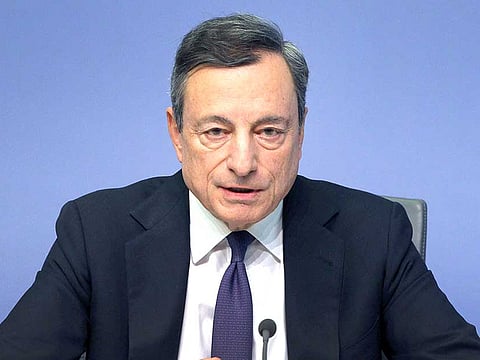Draghi shock hits euro, boosts stocks
Global stocks in tight range ahead of Fed’s policy meeting

London: European shares rallied and the euro took a sharp hit on Tuesday in a knee-jerk reaction to European Central Bank President Mario Draghi’s comments indicating a possibility of new rate cuts or asset purchases.
The euro fell 0.24 per cent to 1.1191 as of 0845 GMT after Draghi said the ECB will need to ease policy again, if inflation doesn’t head back to its targets, and that there was still “considerable headroom” to do it.
Those signals come a day ahead of the widely anticipated US Federal Reserve policy decision, where expectations are running high that Draghi’s counterpart Jerome Powell will likely lay the groundwork for a rate cut later this year.
“In just a few months, the market has turned from being guided by the Fed to actively guiding the Fed,” wrote interest rate strategists at Bank of America Merrill Lynch.
The US central bank is likely to leave borrowing costs unchanged, but markets are almost fully pricing in a 25-basis-point rate cut for July.
The meeting will also provide the most direct insight yet into how deeply policymakers have been influenced by the US-China trade war.
The impact of US restrictions on exports to China is already reflecting in Europe with German silicon wafer maker Siltronic warning that the spat would hit its sales and profitability.
The warning knocked European technology stocks, but a sharp reversal in the euro and rate cut signals drove the pan-European STOXX index 0.7 per cent higher as of 0837 GMT.
In Asia, MSCI’s broadest index of Asia-Pacific shares outside Japan edged up 0.6 per cent, while Japan’s Nikkei dipped 0.7 per cent. MSCI’s gauge of stocks across the globe rose 0.15 per cent, boosted by Europe.
“Markets have been very tentative over the last few sessions, trading largely sideways ... oil dropping and gold rising is also an ominous sign,” said John Woolfitt at Atlantic Markets.
Oil prices dipped 0.2 per cent on Tuesday on global growth worries, although losses were capped by tensions in the Middle East after last week’s tanker attacks.
Acting US Defence Secretary Patrick Shanahan announced on Monday the deployment of about 1,000 more troops to the Middle East for what he said were defensive purposes, citing concerns about a threat from Iran.
The dollar index, tracking the greenback against six major peers, is holding tight at two week highs.
The Australian dollar fell to a fresh five-month low of $0.6830 after minutes from the Reserve Bank of Australia’s June meeting showed policymakers thought it may have to ease again to push down unemployment and revive wages and inflation.
The central bank cut rates to a record low of 1.25 per cent earlier this month to support the slowing economy.
Meanwhile, sterling steadied after hitting 5-1/2 month lows as traders waited for news on the contest for the leadership of the ruling Conservative party.
“The fact that Boris Johnson will most likely become the new prime minister hangs like a sword of Damocles over the trend of the pound. With this in mind, investors are currently rather reluctant to place too much trust in the currency,” said Marc-Andre Fongern, a strategist at MAF Global Forex in Frankfurt.
In the developing world, stocks were set to snap a four-day losing run on Tuesday, while emerging markets currencies edged firmer against the dollar as cautious optimism crept into markets ahead of the Fed meeting.
Inflation in the Eurozone slowed to 1.2 per cent in May, the lowest rate in more than a year, as price growth in the energy and services sectors slackened.



